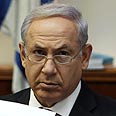
PM to US: How will you handle Iran?
Leaked document reveals that on April 2009, shortly after taking office, Netanyahu met with American lawmakers and asked them at least three times what US planned to do about nuclear threat
Netanyahu wondered what would happen to the Middle East if the Islamic Republic attained a nuclear weapon. He asked what the United States planned to do if that happened, and how it would act if extremists took over Pakistan, which already had an atom bomb.
Congresswoman Jane Harman told the prime minister that the US must give diplomatic efforts a chance, explaining that if the efforts failed, the Americans could at least say that they tried.
Republican Senator Jon Kyl said that US President Barack Obama would advance the diplomatic efforts to reach out to Tehran, but said he doubted the move would succeed. Netanyahu said in response that the US must move quickly, and that the diplomatic efforts should be limited in time and have a specific goal.
"For example, talking to the Iranians for four to 12 weeks and clarifying that the US goal is to put an end to their nuclear program," he said. The prime minister leaned forward and repeated his previous question: "What will you do if it doesn't work?"
According to the cable, he repeated the same question at least three times during the conversation.
Netanyahu went on to clarify that he had no intention of linking the talks with the Palestinians to the progress on the Iranian issue. He said that the government and 80% of the public believed the Palestinians should rule themselves.
The prime minister also warned that if Hamas imposed a conflict, Israel would have to initiate another military operation in Gaza. "Israel doesn't want to enter Gaza again, but it will do what it takes to defend its citizens," he said.
'Abbas must be a leader'
Another leaked cable reveals Netanyahu's attitude towards the Palestinians half a year later. In a meeting with Senate workers in December 2009, the prime minister's political advisor Ron Dermer said Netanyahu was "running out of patience" after taking many moves to resume peace talks with the Palestinians, unsuccessfully.
Dermer noted that progress had been made in terms of roadblocks and outposts in the West Bank, mentioned the fact that Netanyahu had adopted the two-state solution in his Bar-Ilan speech in June 2009, had allowed "violent" elements to take part in a Fatah conference in the West Bank and had frozen settlements construction.
The advisor claimed that the last decision was a tough one and that 70% of Israelis opposed a building freeze, but the person who wrote the cable said the Americans believed he was exaggerating.
Netanyahu's advisor harshly criticized Palestinian President Mahmoud Abbas during the meeting, saying that the Israeli government understood his constraints and was aware of the fact that Arab countries don't support the peace process, but that at the end of the day Abbas must "be a leader".
Dermer also mentioned the Goldstone Report, which accused Israel of committing war crimes in the Gaza Strip. He said Netanyahu would find it difficult to consult his cabinet on the peace talks with the Palestinians, "when all the Israeli government got in return for these efforts was a reprimand from the international community (over the Goldstone Report)."
Roi Kais, Aviel Magnezi and Yuval Mann contributed to this report
- Follow Ynetnews on Facebook










